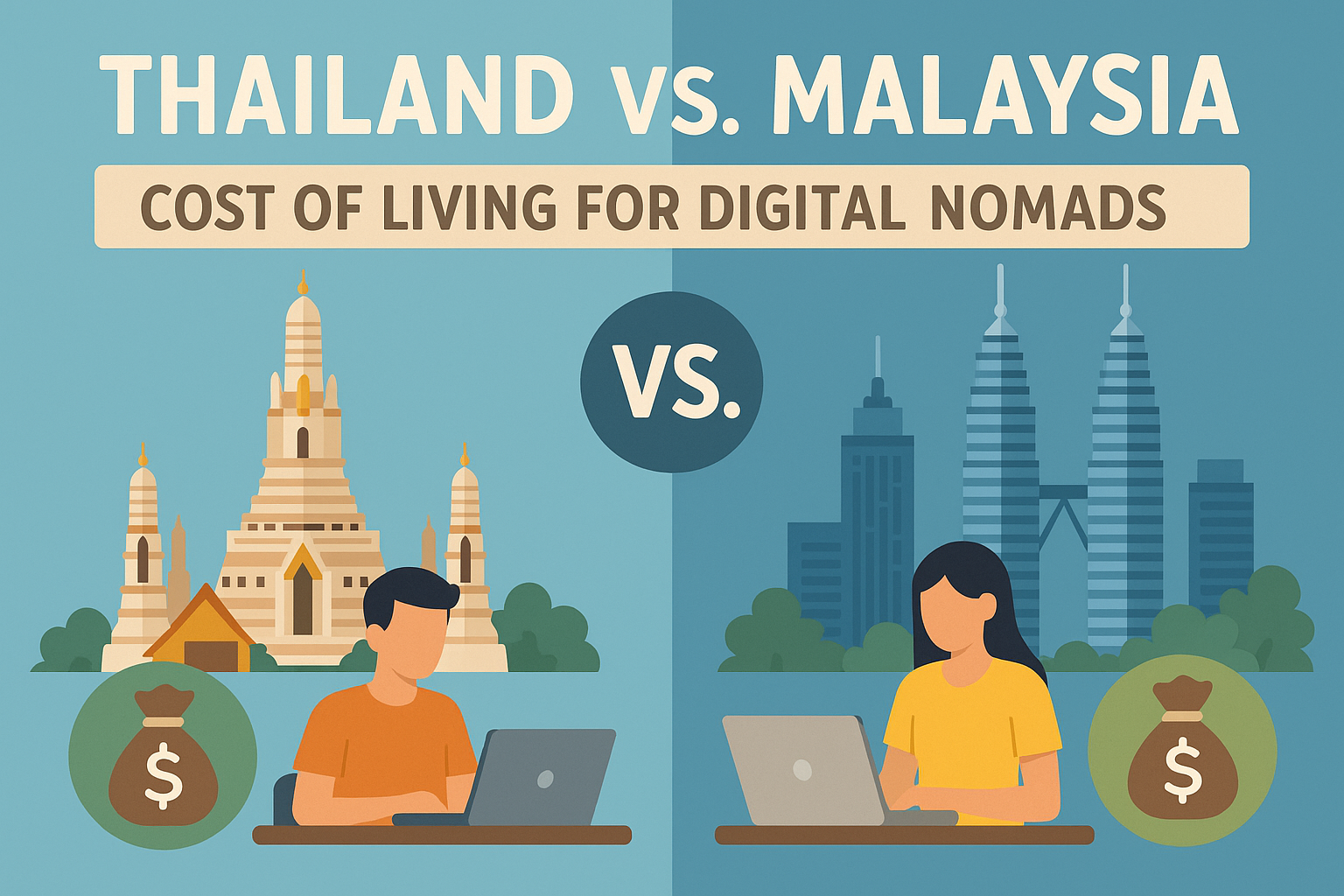In 2025, Thailand and Malaysia remain Southeast Asia’s top digital nomad hubs, with Chiang Mai averaging $650–$800/month and Penang $600–$750/month. This guide compares housing, food, transport, and connectivity costs to help nomads choose the best base for budget and lifestyle. As a nomad, I’ve worked from Bangkok’s coworking spaces and Kuala Lumpur’s condos, refining these insights. Costs vary by lifestyle; check providers.
Why Cost of Living Matters
Low costs extend your travels, reduce work pressure, and fund adventures like diving in Phuket or hiking in Penang. Thailand and Malaysia offer affordability, but their expenses and vibes differ, impacting your nomad experience.
Housing: Where to Crash
Housing sets your nomad foundation:
- Thailand: Chiang Mai’s one-bedroom apartments cost $250–$400/month, Bangkok’s central condos $600–$900, and Phuket’s beach pads $400–$600 (freakingnomads.com).
- Malaysia: Kuala Lumpur’s modern condos with pools run $400–$600, Penang’s apartments $300–$450, and Malacca’s units $250–$400 (slowertravels.com, @MarcusDJohnson7).
Verdict: Malaysia offers better urban amenities for similar costs, but Thailand’s smaller cities and beaches are cheaper.
Food: Eating Like a Local
Both countries excel in affordable cuisine:
- Thailand: Street food (pad thai, mango sticky rice) costs $1.50–$2. Local restaurants charge $3–$5. Weekly groceries (rice, veggies, eggs) run $20–$30 (frayedpassport.com).
- Malaysia: Hawker stalls (nasi lemak, roti canai) cost $2–$3. Restaurants charge $4–$6. Groceries for a week cost $30–$40, with Malay, Chinese, and Indian options (slowertravels.com).
Verdict: Thailand’s street food is slightly cheaper, but Malaysia’s culinary diversity adds value.
Transportation: Getting Around
Mobility is key for nomads:
- Thailand: Bangkok’s BTS/MRT costs $1–$2/ride, Grab bikes/tuk-tuks $3–$5, and buses to Chiang Mai $15–$20. Scooter rentals are $100/month (expatgo.com).
- Malaysia: Kuala Lumpur’s LRT/buses cost $0.50–$1.50/ride, Grab rides $2–$4, and buses to Penang $10–$15. Scooter rentals run $70–$100/month (slowertravels.com).
Verdict: Malaysia’s public transport is cheaper and modern, but Thailand’s scooters and tuk-tuks keep short trips affordable.
Connectivity: Staying Online
Reliable internet is a nomad must:
- Thailand: A 10GB SIM (AIS, TrueMove) costs $12–$18/month. Chiang Mai coworking (Punspace) is $5/day or $80/month. Café Wi-Fi is free with a $2 coffee (nomadlist.com).
- Malaysia: A 12GB SIM (Digi, Maxis) costs $10–$15/month. Kuala Lumpur coworking (Common Ground) is $6/day or $100/month. Café Wi-Fi varies (nomadlist.com).
Nomad Tip: Test Wi-Fi (20–50 Mbps for uploads) via speedtest.net.
Verdict: Malaysia’s data plans are cheaper, but Thailand’s coworking is more affordable and widespread.
2025 Cost-of-Living Comparison Table
| Category | Thailand (Chiang Mai) | Malaysia (Penang) | Nomad Fit |
|---|---|---|---|
| Rent (1-bedroom) | $250–$400 | $300–$450 | Malaysia: better amenities |
| Food (monthly) | $150 (street: $1.50–$2) | $160 (hawker: $2–$3) | Thailand: cheaper street food |
| Transport | $50 (BTS: $1–$2) | $40 (LRT: $0.50–$1.50) | Malaysia: cheaper public transit |
| Connectivity | $30 (SIM: $12–$18) | $25 (SIM: $10–$15) | Malaysia: cheaper data |
| Total (monthly) | $650–$800 | $600–$750 | Thailand: lower for small cities |
Nomad Budgeting Checklist
- Budget 25–35% of income for rent ($250–$600).
- Eat street food 3–4 times/week to save $20–$30.
- Use public transport or scooters ($40–$100/month).
- Test Wi-Fi (20–50 Mbps) before booking.
- Track expenses with YNAB ($14.99/month, ynab.com).
A 2025 Nomad Success: Malaysia’s DE Rantau Pass
A nomad used Malaysia’s DE Rantau Nomad Pass ($200/year) to stay in Penang for 12 months, accessing nomad hubs and tax-exempt foreign income. Their $400 condo with 50 Mbps Wi-Fi and coworking at The Hive ($90/month) cost $650/month total, saving $150/month versus Bangkok. This shows how visa perks enhance affordability (nomadcapitalist.com).
Cost-Saving Strategies for 2025
- Nomad Visas: Thailand’s Golden Visa ($1,370) or Malaysia’s DE Rantau Pass ($200) offer long-term stays with tax benefits (nomadcapitalist.com).
- Co-Living Discounts: Book Outpost Bali ($600–$900/month) or Punspace Chiang Mai ($500–$700/month) for bundled rent and coworking (coliving.com).
- Blockchain Rentals: Platforms like Rentible (free) use crypto for secure, low-fee bookings in Kuala Lumpur (rentible.io).
- Local Apps: Use Grab (free) for rides and food delivery in both countries.
- Tax Exemptions: Malaysia’s foreign income tax exemption saves nomads 5–10% versus Thailand’s 5–10% tax for 180+ days (nomadcapitalist.com).
Nomad Tip: Negotiate 10–20% off long-term Airbnb stays in Penang or Chiang Mai (airbnb.com).
Thailand vs. Malaysia: Which Wins?
- Thailand: Choose for ultra-low costs ($650–$800/month), vibrant street culture, and nomad communities in Chiang Mai. Drawbacks: tourist crowds, inconsistent Wi-Fi.
- Malaysia: Opt for modern condos, diverse cuisine, and tax perks ($600–$750/month) in Penang or Kuala Lumpur. Cons: less nomad buzz, higher coworking costs.
Verdict: Thailand’s cheaper for budget nomads; Malaysia’s better for polished living.
Why 2025 is Your Year
Thailand and Malaysia offer affordable nomad hubs with distinct flavors. From Chiang Mai’s $250 apartments to Penang’s $10 SIMs, smart budgeting unlocks both. As I work from a Bangkok café with 50 Mbps Wi-Fi, my YNAB app tracks my $700/month spend. Use this guide to choose the nomad hub that fits your budget and lifestyle—share your pick or tip in the comments!







